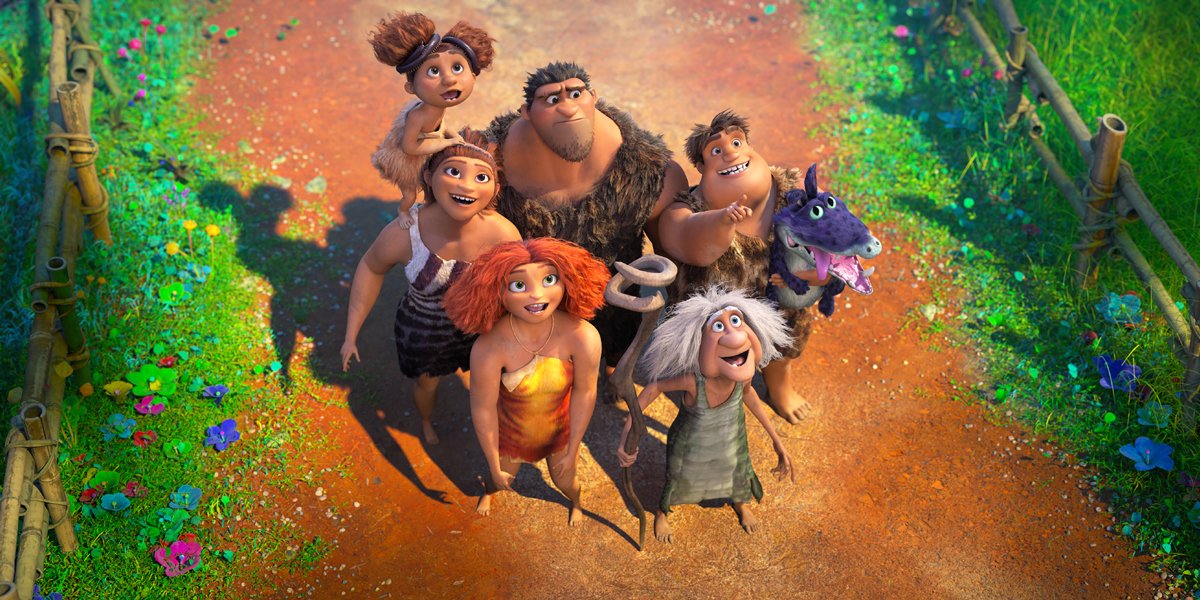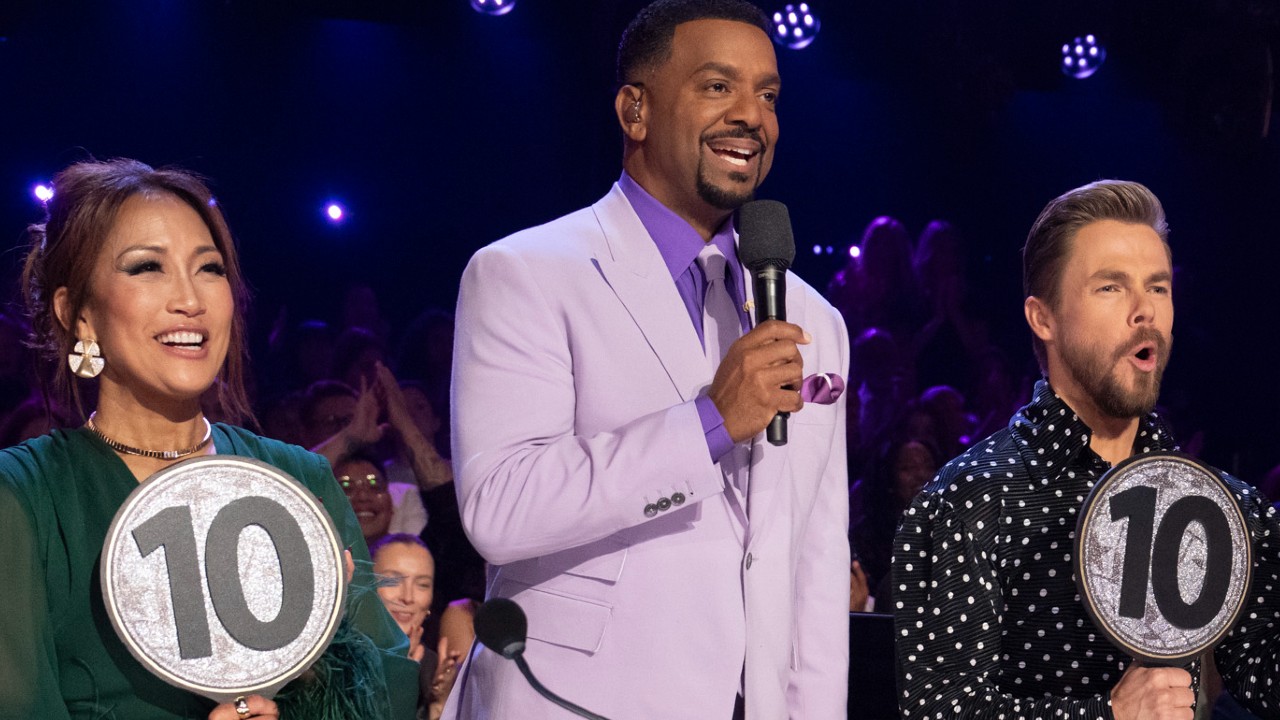In the age of COVID-19, new family movies must be seen as a kind of godsend for households with young children. Safe entertainment options in the outside world are minimalized, and new releases both provide a fresh opportunity to keep kids’ minds occupied, and provide a nice, albeit temporary, respite for guardians. In this respect, Joel Crawford’s The Croods: A New Age is just what the doctor ordered, as it’s more than silly and colorful enough to serve as a distraction, and it even has its moments where it will get adults giggling. At the same time, however, by really no fault of its own, one of its core themes also noticeably clashes with the present zeitgeist in a not-so-great way, rendering it a film that in some ways has more positive intentions than it does executed messaging.
A direct follow-up to The Croods from DreamWorks Animation, which was released a little over seven years ago, A New Age begins zooming through the history of Guy (Ryan Reynolds), who is left on his own as a young boy as a result of his parents getting trapped in a tar pit. Perpetually heading east and searching for a new home, he encounters the Croods clan as a teenager, and while traveling together he and the eldest daughter, Eep (Emma Stone), wind up falling in love. Their public displays of affection prove to be a bit much, but the majority of the family – including Eep’s mother, Ugga (Catherine Keener), brother, Thunk (Clark Duke), and Gran (Cloris Leachman) – like them as a couple… with the exception of Eep’s father, Grug (Nicolas Cage).
Having promoted the importance of the family sticking together since even before they left their cave, Grug is terrified that Guy is going to take Eep away from him so they can start a life on their own together. He becomes increasingly paranoid, but everything changes one day when he is out scouting and discovers something new: a wall. The Croods at first believe that they have possibly hit the end of the world, but that fear dissipates when Grug shows them what’s behind the barrier, and they discover a vast farm.
Of course, a wall and a farm didn’t grow naturally, and the clan of cavepeople are surprised to be introduced to Hope and Phil Betterman (Leslie Mann, Peter Dinklage) – which is a nice way of saying that they get caught in a trap. As it turns out, Hope and Phil are not only a bit more advanced than the Croods, but they are actually former friends of Guy’s parents, and have a teenage daughter named Dawn (Kelly Marie Tran). A chain reaction of conflicts is then initiated, as Guy’s personality starts to change, Eep rebels against Dawn being kept shielded from the outside world, and Grug unfolds a dark mystery that has something to do with the land’s plentiful bananas (none of which he is permitted to eat).
The Croods: A New Age is mostly a collection of familiar plotlines.
The Croods: A New Age doesn’t have the most artfully crafted script, either in its structure or storytelling. It’s actually somewhat startling how it jumps into things with its Guy-centric flashback, as the very first scene of the film is him witnessing the slow death of his parents, and then just a few minutes later he’s operating as the movie’s central source of conflict and freaking out Grug. Ultimately it creates a version of the “Empty Nest Syndrome” arc that audiences are well versed in, and while it’s not executed poorly, it also doesn’t really have anything new to say. The same could be said about the Stone Age class warfare. It’s inoffensive, and by the end has a positive moral, but it also doesn’t leave much of an impression or foster a much of an emotional impact.
Mostly it just feels overloaded. It tries to service its main characters as best it can, but that means sideline-ing others – such as Thunk planting himself in front of a window that is meant to be a metaphor for modern screens, and Gran having a bit involving her wig. In addition to the aforementioned plots, the Bettermans scheme to try and keep Guy while getting the Croods to leave their home, and the mystery with the bananas is both drawn out and features needless escalation. It throws a lot at the wall.
The rejuvenated message about escaping one’s cave is not amazing during a pandemic.
The one area in which the film does make an awesome and subversive move is in the relationship between Eep and Dawn – as while the trope move would to make them romantic rivals jealous of affection received from Guy a.k.a. the only non-relative male of appropriate age – The Croods: A New Age instead opts to have them relate as girlfriend. The problem is that this creates what could be called a “conflict gap,” and what’s chosen to fill it isn’t the greatest fit for 2020. Eep sees herself from the first movie in Dawn, which is to say a girl who needs to be exposed to the outside world and all of its adventures and risks, and that storyline would be totally fine in any other year (for example, it was 100% accepted in 2013 with the release of the first Croods). Unfortunately, it’s not a prime message when medical experts are advising people to stay indoors and avoid social gatherings.
Your Daily Blend of Entertainment News
Again, this isn’t anything that the filmmakers could be faulted for, as the movie was in development for years and couldn’t have possibly predicted that it would be released during a pandemic. When the crisis is over, time will treat it well, but at present it’s a part of The Croods: A New Age that is bit at odds with the greater good.
This is definitely a movie more for kids – which should be interesting for fans of the original The Croods.
All that said, this is mostly a movie for children who won’t be thinking about the societal implications but instead are dazzled by the rainbow-colored Macaw-sabertooth tiger hybrid (one audience that may have a strange reaction to it are those who saw the original as kids, because it’s not exactly a sequel that has matured with those movie-goers). More mature audiences will occasionally chuckle at the physical humor, but more likely will just appreciate it as a 95-minute babysitter.

Eric Eisenberg is the Assistant Managing Editor at CinemaBlend. After graduating Boston University and earning a bachelor’s degree in journalism, he took a part-time job as a staff writer for CinemaBlend, and after six months was offered the opportunity to move to Los Angeles and take on a newly created West Coast Editor position. Over a decade later, he's continuing to advance his interests and expertise. In addition to conducting filmmaker interviews and contributing to the news and feature content of the site, Eric also oversees the Movie Reviews section, writes the the weekend box office report (published Sundays), and is the site's resident Stephen King expert. He has two King-related columns.

